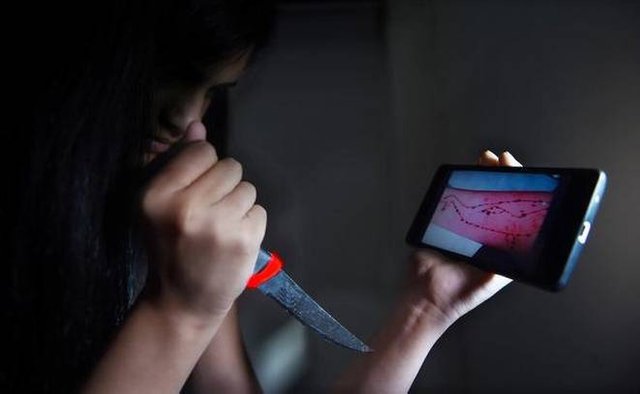At a Glance (Blue Whale Game)
From Wikipedia, the free encyclopedia

The Blue Whale Game (Russian: Синий кит, translit. Siniy kit), also known as "Blue Whale Challenge", is a 21st-century social network phenomenon that is claimed to exist in several countries, beginning in 2016. The game reportedly consists of a series of tasks assigned to players by administrators over a 50-day period, with the final challenge requiring the player to commit suicide.[1][2]
"Blue Whale" came to prominence in May 2016 through an article in Russian newspaper, Novaya Gazeta, that linked many unrelated child suicides to membership of group "F57" on the Russian-based VKontakte social network. A wave of moral panic swept Russia.[3] However the piece was later criticised for attempting to make a causal link where none existed, and none of the suicides was found to be as a result of the group activities.[3][4][5]
Structure
While many experts suggest "Blue Whale" was originally a sensationalised hoax,[6][7][8] they believe that it is likely that the phenomenon has led to instances of imitative self-harming and copycat groups, leaving vulnerable children at risk of cyberbullying and online shaming.[8] Blue Whale is described as being based on the relationship between participants (or challengers) and administrators.[9][10] The administrators prescribe a series of duties that players must complete, usually one per day, some of which involve self-mutilation.[11] As of late 2017, participation in Blue Whale seems to be receding;[12] however, internet safety organisations across the world have reacted by giving general advice to parents and educators on suicide prevention, mental health awareness, and online safety in advance of the next incarnation of cyberbullying meme.[13][12][5]
Arrests
In 2016, Philipp Budeikin, a 21-year-old former psychology student who was expelled from his university, claimed that he invented the game in 2013. He said his intention was to cleanse society by pushing persons to suicide whom he deemed as having no value.[14][15] Although originally claiming innocence and stating he was "just having fun", Budeikin was arrested and held in Kresty Prison, St Petersburg and in May 2016 pled guilty to "inciting at least 16 teenage girls to commit suicide."[14] He was later convicted on two counts of inciting suicide of a minor.[16]
In June 2017, postman Ilya Sidorov was arrested in Moscow, also accused of setting up a "Blue Whale" group to encourage children to self-harm and ultimately commit suicide. He claimed to have persuaded 32 children to join his group and follow commands.[17]
Reported cases
Bangladesh
Many news reports have published on Bangladeshi media about attempted suicide related with the game.[19][20] A teenage girl committed suicide allegedly from the addiction of the game in October, 2017.[21] A Chittagong University student was arrested by the Bangladeshi police for playing the game.[22]
good
good
good
gd